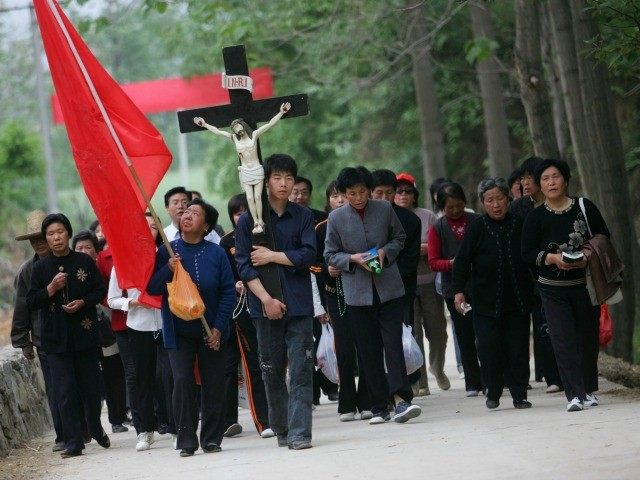A new report from Freedom House titled “The Battle for China’s Spirit: Religious Revival, Repression, and Resistance Under Xi Jinping” argues that persecution of Christians and other faiths has intensified under the current Chinese president, Xi Jinping.
“At least 100 million people – nearly one-third of estimated believers in China – belong to religious groups facing ‘high’ or ‘very high’ levels of persecution,” Freedom House reports, listing Protestant Christians, Tibetan Buddhists, Uighur Muslims, and the Falun Gong among those groups. The plight of Falun Gong was spotlighted, but perhaps not enough, when the Miss World contest bowed to Chinese demands to stifle Chinese-born Miss Canada Anastasia Lin.
Here is a taste of what awaits religious believers in Communist China:
A Taoist disciple joins the order without knowing when he will be admitted to priesthood. Dozens of Christians are barred from celebrating Christmas together. Tibetan monks are forced to learn reinterpretations of Buddhist doctrine during a “patriotic reeducation” session. A Uighur Muslim farmer is sentenced to nine years in prison for praying in a field. And a 45-year-old father in northeastern China dies in custody days after being detained for practicing Falun Gong.
These are a small sample of the obstacles that Chinese believers encounter when they seek to peacefully practice their faith—products of the ruling Communist Party’s multifaceted apparatus of control. Combining both violent and nonviolent methods, the party’s policies are designed to curb the rapid growth of religious communities and eliminate certain beliefs and practices, while also harnessing aspects of religion that could serve the regime’s political and economic interests.
Since Xi Jinping took the helm of the Chinese Communist Party (CCP) in November 2012, the authorities have intensified many of their restrictions, resulting in an overall increase in religious persecution. But believers have responded with a surprising degree of resistance, including in faith communities that have generally enjoyed cooperative relationships with state and party officials.
It is good news that the resistance in China has been able to push back so effectively and that some parts of China seem relatively safe for ordinary believers, but it is still completely unacceptable that pushback against such oppression is necessary since China aspires to a position of lofty respect in the civilized world. Religious tolerance should be a non-negotiable part of the price Beijing pays for the stature it craves.
According to Freedom House, religious oppression in China can range from “deeply offensive” meddling such as “vetting religious leaders for political reliability,” extensive surveillance, and politicizing the content of worship services, to vandalism, detention, and death.
The Politburo seems especially concerned about the menace of Protestants, with their “Western values,” and Uighur Muslims. Among other indignities, Freedom House states that “incidents of security forces opening fire on Uighur civilians have become more common.” It is interesting that so many commentators obsessed with “Islamophobia” in the West have little to say about its far more virulent incarnation in China.
Xi Jinping is seen as both more eager to co-opt religion for his political ends, “linking them to his own signature concepts of the ‘China Dream’ and the great rejuvenation of the Chinese nation,” and more hostile to faith groups which import Western ideas.
“The party is essentially bracing itself for the potential political impact of an economic downturn while seeking new sources of legitimacy. The new religious restrictions bear markers of Xi’s particular mode of governance, including the ‘rule by law’ emphasis on legislation, an expansion of party-state representation in various social entities, and dedicated efforts to rein in social media activity,” Freedom House writes.
It is cause for concern that the effective resistance of religious groups threatens to destabilize Chinese government. A great intellectual and spiritual revival that purges China of authoritarianism would be lovely, but that probably isn’t how the conflict would play out.
It may be a hopeful sign that the Vatican is reportedly close to a deal on ordaining Chinese bishops, but CNN spoke with an underground Catholic priest named Paul Dong who wasn’t thrilled by the prospect of Beijing and the Vatican growing closer. “Jesus said one person cannot serve two gods, now the Vatican is willing to serve God and the Communist Party,” he said.
Retired Cardinal Joseph Zen, who was once Bishop of Hong Kong, said much the same thing. He feared the Vatican risked “selling out” Chinese Catholics and getting a “bad deal” that helps Beijing control or stamp out the underground church movement.
In an interview with LifeSite News, Zen worried that Pope Francis is “rather naive” about the true nature of the Chinese government. He feared the Pope is surrounded by people who are “not good at all” and have “very wrong ideas,” one of which appears to be selling out the underground church movement as “troublemakers.”
Stamping it out might be a tall order, as one of Dong’s parishioners declared to CNN that the government-approved “patriotic churches” are not “real churches.” Presumably, the other groups listed as strongly oppressed by Freedom House feel the same way about Beijing’s state-sponsored, state-friendly places of worship.

COMMENTS
Please let us know if you're having issues with commenting.